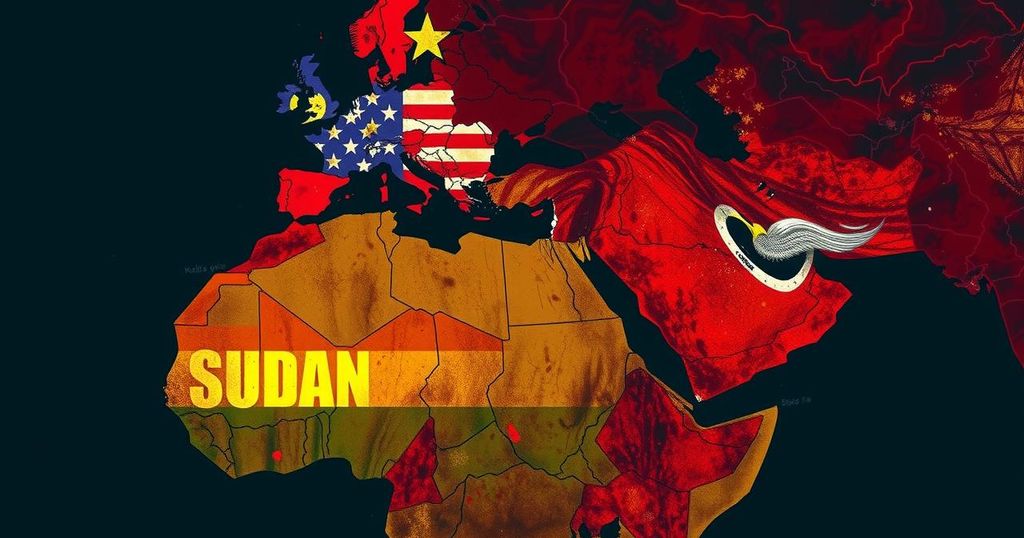Guterres: Foreign Powers Fueling Sudan’s Escalating Conflict
UN Secretary-General António Guterres warns of a humanitarian crisis in Sudan fueled by foreign powers as the conflict between military and paramilitary forces escalates. Over 24,000 people have died, and millions face displacement and famine. Guterres calls for an immediate ceasefire and accountability for human rights violations during this ongoing conflict.
The ongoing conflict in Sudan, marked by fierce hostilities between military and paramilitary factions, is being exacerbated by foreign entities, according to United Nations Secretary-General António Guterres. Speaking before the U.N. Security Council, he characterized the situation as a severe humanitarian crisis, expressing concern that the 18-month conflict could destabilize broader regions including the Sahel, the Horn of Africa, and the Red Sea. In a somber briefing, Guterres highlighted the dire plight of the Sudanese populace, who are enduring horrific conditions that include widespread violence, ethnic conflict, and a pervasive threat of famine, particularly affecting over 750,000 individuals in displacement areas in North Darfur. He drew attention to alarming reports of mass killings and sexual violence in the east-central Gezira province, where recent attacks have resulted in the tragic loss of more than 120 lives. Since the outbreak of hostilities in April 2023 due to escalating tensions among military leaders, Sudan has faced unprecedented violence that has claimed over 24,000 lives. This warfare has precipitated a humanitarian disaster, displacing over 11 million individuals, with millions seeking refuge in neighboring nations. Guterres urged both involved parties to reach an immediate ceasefire agreement, enhance the protection of civilians, and facilitate humanitarian assistance for those in need. Expressing his horror at the ongoing violence, Guterres condemned the attacks on civilians perpetrated by both the paramilitary Rapid Support Forces and affiliated factions of the Sudanese Armed Forces, particularly in regions experiencing famine conditions. He asserted that violations of international humanitarian law should be met with accountability. The conflict emerges from Sudan’s turbulent transition from a pro-democracy movement that ousted long-time dictator Omar al-Bashir, leading to a brief democratic period before the current violent upheaval. The humanitarian toll has caused global condemnation, with agencies recognizing many acts as potential war crimes or crimes against humanity, echoing the atrocities experienced during the Darfur genocide. Karim Khan, prosecutor for the International Criminal Court, indicated in January that there are credible reasons to suspect both factions may be engaging in war crimes or atrocities reminiscent of past brutalities in Darfur. This conflict signifies a grave moment in Sudan’s history, with echoes of previous traumas resurfacing as the humanitarian situation continues to deteriorate, demanding urgent international attention and action.
The conflict in Sudan intensified in April 2023, following longstanding tensions between the military and rival paramilitary forces, particularly the Rapid Support Forces. Amidst social upheavals and the aftermath of a pro-democracy uprising that saw the removal of Omar al-Bashir, the nation has spiraled into violence leading to a humanitarian crisis. The conflict has been characterized by numerous human rights violations, including mass killings, sexual violence, and ethnic cleansing, particularly in the troubled region of Darfur, which has a historical legacy of such atrocities dating back two decades. The situation necessitates immediate intervention to prevent further escalation and support for the millions affected by these conflicts.
In summary, the humanitarian crisis in Sudan has reached alarming proportions, exacerbated by foreign interference in the ongoing conflict between military and paramilitary forces. Secretary-General António Guterres has condemned the violence against civilians and called for immediate action to ensure the protection of those in dire need. As the situation deteriorates, the world watches with growing concern over the potential for regional instability and the urgent need for humanitarian assistance, placing accountability for war crimes at the forefront of international discussions.
Original Source: www.africanews.com




Post Comment